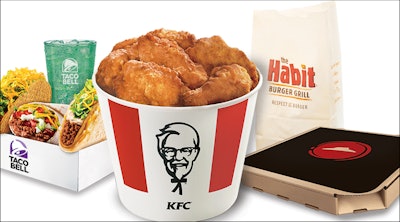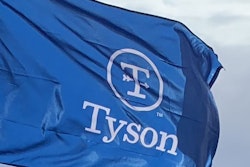
Owner of KFC, Yum! Brands, is taking another step on its journey to reach net zero greenhouse gas emissions by 2050 with its new sustainable packaging policy for its chicken and other food items.
Yum’s policy, which aims to put materials back into the supply chain after use, also known as circularity, consists of three parts:
1. The elimination of unnecessary packaging,
2. The shift to more sustainable materials
3. And the support of better recycling systems and reusable products.
“At Yum!, we’re committed to good growth. We can’t do that without a plan to preserve our planet,” said Jon Hixson, Yum! chief sustainability officer & vice president of global government affairs. “From our packaging initiatives to the work we’re doing on forest stewardship and climate change, we are dedicated to making progress on our Recipe for Good.”
KFC’s sustainable packaging
If the plastic item is not recyclable – for example, plastic straws, cutlery and bags – then KFC’s all over the world have begun to replace them with recyclable or compostable material.
To become more sustainable, but still maintain branding, KFCs in the U.K. have replaced the recognizable chicken bucket with a recyclable, plastic-free one, and Canada’s KFCs have replaced the poutine bucket with one made of recyclable bamboo.
“By using new materials and methods of making buckets, we are able to source a more sustainable alternative while staying true to our iconic bucket, which our customers know and love,” said Susan Miles, KFC global director of sustainability & packaging.
Many of KFC’s sides also come in styrofoam packaging, or polystyrene plastic, which the brand is phasing out to replace with recyclable plastic or fiber-based containers sourced from responsibly managed forests.
Pizza Hut, Taco Bell, and The Habit Burger Grill’s sustainable packaging
In addition to KFC, Yum! Brands also owns Taco Bell, Pizza Hut and The Habit Burger Grill with 55,000 locations globally, all taking part in reducing plastic waste.
According to Yum!, Pizza Hut has a leg up since most of the packaging is cardboard already, but the remaining plastic is gradually being eliminated.
“We remain focused on closing the gaps that exist around unnecessary plastics and have also started to explore how we can use our packaging as a way to educate customers on how to recycle them,” said James Watts, Pizza Hut global chief people & environmental, social & governance (ESG) officer.
According to Watts, Pizza Huts in India and Brunei have eliminated 100% of consumer-facing plastic, and locations in New Zealand and Australia have eliminated 95% and 90% of their plastic packaging, respectively.
Taco Bell and The Habit Burger Grill have made their own sustainability progress with Taco Bell replacing its bags and wrappings with recyclable material and The Habit Burger Grill using paper bags instead of plastic, eliminating 288,000 pounds of plastic in the U.S. every year.















